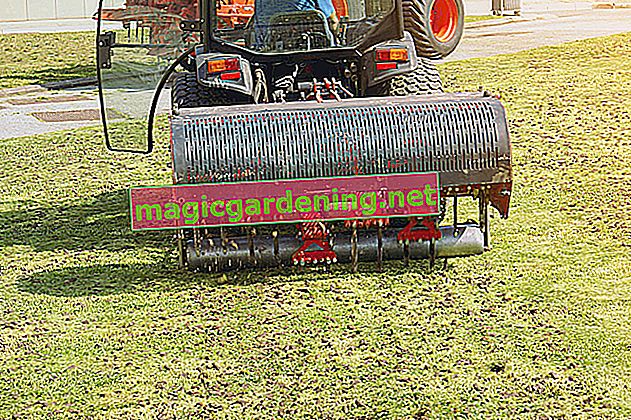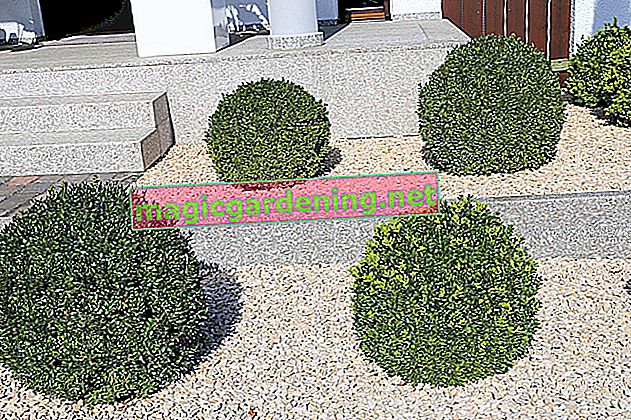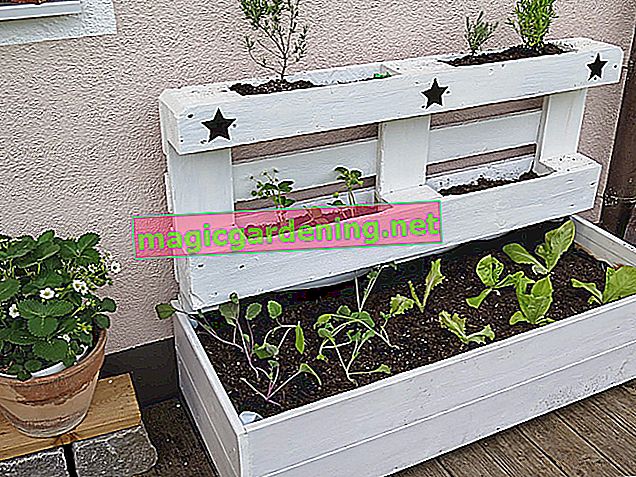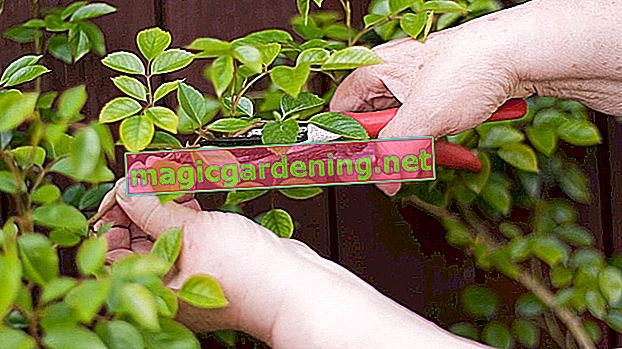
What does aerating actually mean?
There is a widespread misconception among amateur gardeners that the terms aerate and scarify denote the same maintenance measure. In fact, with a scarifier, you comb moss and weeds from the surface of the lawn by using rotating motor rollers to score the sward 3-5 mm deep. If, on the other hand, you aerate the lawn, use the following operating principle:
- The devices pierce the sod up to 100 mm deep with soil nails or hollow spoons
- The even punching at a distance of 15-20 cm breaks up compaction
- The earth that has risen into the hollow spikes is collected and disposed of
also read
- Freshen up your lawn - aerate and sand
- Sand the lawn properly - this is how sand makes the lawn green
- Problems with too dense lawn
When you de-aerate your lawn in this way, harmful waterlogging is eliminated and does not re-form. In addition, more oxygen reaches the grass roots in order to activate growth there.
When does it make sense to aerate the lawn?
In winter, permanent wetness and frosty temperatures damage the sensitive sward. Moss spreads, weeds push their way and waterlogging forms. As if that weren't enough, the summer activities with playing children, set up paddling pools and exuberant barbecue parties also put the sod under pressure. You can find out here when you can be particularly good at ventilating the lawn:
- Aerate the lawn in March / April after the first mowing
- Ventilate the stressed grass area again in September / October
- Ventilate heavily frequented green areas, such as golf courses or sports fields, every 6-8 weeks between March and October
Correct aeration is undoubtedly associated with additional work. Anyone who wants quantitative evidence of the urgency of this measure can measure the degree of compaction with a penetrometer. These devices determine the penetration resistance in bar by punching the ground. At the same time, a color reaction provides information about the result, from green (0-15 bar) for unnecessary to yellow (15-22.5 bar) for recommended to red (22.5 bar +) for urgent.
Step-by-step instructions for machine aeration
Aeration optimizes the oxygen supply and the drainage of water from the lawn by using special spikes to perforate the sward. This can be done very easily with the help of machine-operated devices that can be rented in well-stocked DIY stores and rental shops. How to aerate the lawn in an exemplary manner:
- Mow the lawn 3-4 centimeters deep
- Before venting, equip the machine with the appropriate spoons to match the soil quality
- Position the device so that you start along the edge of the lawn
- Pull the lever to set the spikes in motion
- Push the aerator forward at an appropriate speed
- If possible, do not step on the pushed out 'Erdwürste' again so that you can collect them at the end
The pace is decisive in determining whether you are pitting the lawn deep enough. If the devices drive too fast, they will punch holes too far away. If the speed is too low, the lawn will be perforated too much.
Tips
Mechanical aerators are useful, but they make a lot of noise. Prudent hobby gardeners take into account the statutory rest periods for working around aerating the lawn, as they are also prescribed for the operation of the lawn mower. Workdays from 9 a.m. to 1 p.m. and 3 p.m. to 5 p.m.
How to aerate the lawn manually
In order to aerate small lawns, the specialist trade has manually operated devices on offer. Devices with a sturdy rail with a handle with an ergonomic handle are particularly practical. The conical spines positioned at the lower end are hollow. These spoons push the earth up with each hole and collect it in a tub. That is how it goes:
- The ground is freshly mowed, frost-free, neither muddy nor dried out
- To ventilate the sward, make holes 15 cm apart
- The end in the tub is disposed of on the compost
The following rule of thumb serves as a guide to when a lawn is effectively aerated: 200 holes per square meter will sufficiently vent a compacted turf. The devices should be equipped with at least 2 spines. With every additional spoon you aerate the lawn more intensively, you are of course forced to exert more effort with every hole.
Devices for every budget
In order to ventilate an intensively used, large grass area regularly, it can be worth investing in a motorized aerator. For the lawn in the front yard, however, from a financial point of view, the purchase of manual devices is more likely. The following overview presents some common aerators as a decision aid:
| Aerators | PROFI Bauma BA-RL40 lawn rake | Billy Goat Aerator Honda AE 401 H engine | HUSQVARNA aerator TA 36 | Aeration roller | Lawn woodpecker aerator with drip tray |
|---|---|---|---|---|---|
| Working width | 410 mm | 450 mm | 920 mm | 900 mm | 300 mm |
| Working depth | 200 mm | 70 mm | 76 mm | 45 mm | 100 mm |
| Engine power | 5.5 hp | 2.9 kW | pendant | Muscle strength | Muscle strength |
| New price | approx. 3,500 euros | approx. 4,200 euros | approx. 1,570 euros | approx. 1,070 euros | from 224 euros |
| Specialty | Solid and tubular spikes | hardened hollow teeth | for tractors from 16 HP | with 189 spikes | Spoons with a diameter of 16-24 mm |
Scarify mossy grass surfaces first - this is how it works
Hard-working hobby gardeners make their work unnecessarily difficult if they aerate a moss-covered lawn. In addition, too little oxygen reaches the roots in a matted area of grass after drilling. It therefore makes sense to scarify the green before venting. Follow these steps:
- There is mild, dry weather between 10 and 20 degrees Celsius
- As an exception, the lawn is mowed as deep as possible
- Go across the lawn lengthways and crossways with the scarifier in two passes
- Sweep up combed weeds and moss and dispose of them
You can then proceed to aeration of the lawn without any further delay. In the end, don't let the battered appearance put you off. With this intensive care program you have set the course for a velvety green, dense lawn carpet. The following lines convey what is still lacking in fine-tuning.
Sanden brings the perfect ending - this is how it works
Professional aeration leads to a finish in which everything revolves around the holes created. By sweeping in a layer of sand after punching, the lawn area receives effective drainage. How to do it right:
- Spread half a bucket of sand per square meter
- Low-lime quartz sand with a grain size of 0/2 is ideal
- Sweep in the sand evenly with a broom
If the grass growth appears to be particularly sparse after aeration, skilled hobby gardeners combine sanding with reseeding. Thanks to the fine grains of sand, the lawn seeds are distributed excellently and germinate quickly.
Top dressing - sanding at its finest
English lawn artists have developed sanding after aerating the lawn. The experts created the top dressing with the aim of a durable green with a perfect look. The sand is enriched with organic substances such as compost, horse manure or leaf earth. The result was a mixture that not only compensates for unevenness, but also improves the structure of the floor.
Tips & Tricks
During the summer, hobby gardeners often frown about how long a dry lawn should be watered. A sod sample reveals the water requirement. Simply cut out a 10 centimeter deep piece of the lawn. When only the top 3 centimeters have dried, sprinkle the lawn for 1 hour. A 5 cm thick dry layer requires a watering time of 1.5 hours.








